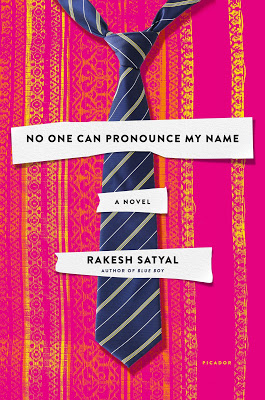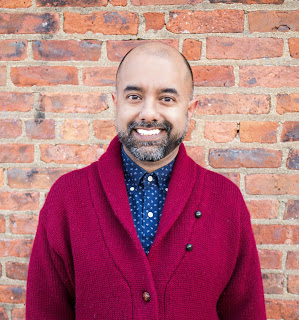I’ve known Rakesh Satyal for most of my adult life, ever since we were young publishing pups coming up at Curtis Brown Ltd. and Random House, respectively. Rakesh has gone on to have a super interesting career. After moving over to a successful editing stint at HarperCollins, Rakesh left the industry to work in branding, before returning recently to work as an editor at Atria Books, a division of Simon & Schuster.
In addition to being a fabulously talented editor, Rakesh is also a fabulously talented writer… plus a fabulously talented singer, which you’ll see at the end! Renaissance man! His debut, Blue Boy, won a Lambda Literary Award, and his follow-up, No One Can Pronounce My Name, was just published by Picador.
Away we go!
NATHAN: You had a lot of success with your debut Blue Boy, including winning a Lambda award. What was it like to return to the well after that and write a second novel? What does No One Can Pronounce My Name mean to you?
RAKESH: With Blue Boy, I had a pretty firm idea of who the protagonist would be and what his voice would be and what the trajectory of the story would be. With No One Can Pronounce My Name, the approach was quite different. I began writing one of the central characters, Harit, as if he were in a short story, and it wasn’t until a bit farther into the writing process that I realized he would intersect with the other key character, Ranjana, and that their story would be a novel about this intersection, about friendship.
A fundamental theme of the book is how we process loneliness — and how this kind of emotional processing can be constructive rather than destructive — so the intent of the book is really to help people feel less alone and to show them that their journey to, through, and sometimes back to loneliness is important and often necessary for growth. I have personally found that discussion meaningful and hope that others do, too.
You have had a super interesting career, rising up to to become an editor at Random House and HarperCollins, then leaving publishing to work in branding, and now you’re back as an editor at Atria. What was the biggest thing you noticed about the publishing industry when you returned?
I know that people invoke the topics of diversity and representation often, but that’s because we have a long way to go on those fronts — still. All the same, one of the reasons why I joined the team at Atria is because the imprint has a long history of hiring people of diverse backgrounds and publishing books across a wide spectrum, so I felt seen and heard.
The other big difference — and this is a great one, of course — is that the rise/resurgence of the indie bookstore is real. Having just completed a book tour, I can tell you that the booksellers at those stores are all the more dedicated and passionate, and that’s a wonderful thing for everyone to see, from writers to agents to editors to, most of all, readers.
What’s the biggest thing you learned outside of publishing that you’re now applying to your job as an editor?
This may sound broad or overly general, but the importance of innovation cannot be overstated. In my branding roles, I often saw how a client or company that could truly take stock of what had come before and think of ways to add something new to the equation often garnered an audience far beyond that which they may have originally envisioned.
Similarly, as an editor, I think that you can assume that your readers, who are already so smart and eager for fresh writing, want innovation more than confirmation, that they want you to be taking the kind of creative risks that afford them something distinctive and eye-opening as they read.
What is one thing you learned about editing as a result of being a published author, and one thing you learned about writing as a result of being a professional editor?
I had the very good luck of having yet another amazing editor for this latest book (Anna deVries at Picador), so I learned a lot about what particular idiosyncrasies I have a writer that might be helpful or detrimental (I can’t share the specifics of those with you or I’d have to make you sign a Faustian pact).
On the flip side, I think my editing life has allowed me to give myself permission to simply push forward and create instead of constantly questioning the legitimacy of my work. The best editors will encourage you to follow your instincts; in fact, as an editor, I often encounter situations in which an author already knows, deep-down, that something might not be working but wants to plow ahead anyway just for the sake of getting the project done. Being able to check in with myself and be honest with myself when I’m trying to ignore certain weak spots is definitely something that has helped me.
On a recent panel, you were quoted as saying “Publishing is all about trickle down enthusiasm.” What do you mean by that?
The editor’s job is very different from what people outside of publishing may think. The typical portrait of an editor in the larger culture is that of a copyeditor, in fact. That is, to be sure, vital work, but the editor within a publishing house is really a liaison among the author, the agent, the publishing house (including production, publicity, marketing, and sales), and the eventual readership. Since engaging those within the publishing house requires numerous meetings over the course of years, the editor really has to be the most passionate advocate for the book because that enthusiasm has to carry over to all of those people.
If you could wave a magic wand over the publishing industry, what would you change?
I would love to see more people of minority backgrounds represented in publicity, sales, and marketing. I obviously wish the same for editorial, but most people when they apply for entry-level positions in publishing tend to think of editorial alone. I think that having representation in those other areas is just as important, if not more so.
Anything else you’d like to add? The floor is yours!
We’re living in unprecedented times, to be sure, but No One Can Pronounce My Name is about a life-saving friendship between immigrants, so I hope you’ll check it out. It’s by engaging with personal stories — not sweeping generalizations — that we change the world and meaningfully engage with each other, and I hope that this is one of those stories that can make a difference. Oh, and on a much lighter note, check out this Hamilton-themed book trailer I made for it!
RAKESH SATYAL is the author of the novels No One Can Pronounce My Name (just out this month from Picador) and Blue Boy (Kensington Books), which won a 2010 Lambda Literary Award and the 2010 Prose/Poetry Award from the Association of Asian American Studies and which was a finalist for the Publishing Triangle’s Edmund White Debut Fiction Award. Satyal was a recipient of a 2010 Fellowship in Fiction from the New York Foundation for the Arts and two fellowships from the Norman Mailer Writers’ Colony. His writing has appeared in New York magazine, Vulture, Out magazine, and The Awl. A graduate of Princeton University, he has taught in the publishing program at New York University and has been on the advisory committee for the annual PEN World Voices Festival. He lives in Brooklyn.
I’m available for manuscript edits, query critiques, and consultations! And if you like this post, check out my guide to writing a novel.





I appreciate the publishing industry's commitment to more diverse/#ownvoices authors. Mr. Satyal, you are an inspiring success story on many levels. People like you help the commitment grow.
Thanks to Rakesh Satyal and Nathan for this interesting and thoughtful interview.
A super-interesting career, indeed. Great questions and answers really helped to evoke a thoughtful and detailed picture of this career and the man, Rakesh Satyal.